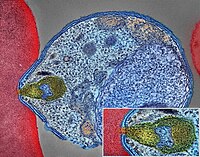
Photo from wikipedia
The recent World Health Organization moratorium on rectal artesunate (RAS) for pre-referral treatment of severe childhood malaria is costing young lives. The decision was based on disappointing findings from a… Click to show full abstract
The recent World Health Organization moratorium on rectal artesunate (RAS) for pre-referral treatment of severe childhood malaria is costing young lives. The decision was based on disappointing findings from a large observational study that provided RAS to community health workers with little training and supervision. This non-randomized, operational research has provided useful information to guide the implementation of RAS but is subject to bias and confounding and cannot be used to assess treatment effects. Parenteral artesunate reduces severe malaria mortality and a large body of evidence also shows RAS has lifesaving efficacy. There is now more than a decade of delay in conducting the necessary engagement and training required for successful deployment of RAS. Further delays will result in more preventable deaths.
Journal Title: Transactions of the Royal Society of Tropical Medicine and Hygiene
Year Published: 2023
Link to full text (if available)
Share on Social Media: Sign Up to like & get
recommendations!